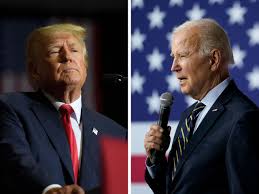Biden’s election strategy – He is not Trump

US President Joe Biden ‘s strategy for a second term seems focused on the fact that he is not Donald Trump, but will it be enough to remain in the White House after the November presidential elections?
His landslide victory in the Iowa Republican primary has paved the way for Trump’s rematch with Biden that the 81-year-old Democrat appears to relish.
Despite his low popularity and voting intention ratings in polls, in which he is neck and neck or behind Trump, the Democratic leader suggests that his predecessor is his preferred rival.
Biden is focused on telling voters what he is not, but some Democrats would prefer that he communicate what he will do if he stays in power for four more years.
At his rallies he has portrayed Trump, who is facing several criminal and civil proceedings, as a dictator.
He says the Republican magnate is obsessed with retaliation, and he is the only one who can defeat him and save America’s institutions.
“These elections will ultimately be between Donald Trump and Joe Biden. And that brings clarity,” Abou Amara, a lawyer and Democratic strategist, told AFP.
“It won’t just be a debate about policies, it will be a fight over democracy itself,” he added.
Fear factor
Biden’s entourage also uses the fear factor to attract voters.
Vice President Kamala Harris has said she is “scared” at the possibility of Trump returning to the White House, while former first lady Michelle Obama has acknowledged being “terrified.”
Trump, who has falsely claimed that Biden’s 2020 election victory was a “theft,” counterattacks by saying that Biden is the one threatening democracy.
Critical voices, especially younger and more progressive Democrats, complain that Biden does not explain how he plans to improve their lives in a second term.
His campaign strategists have stopped boasting about his grand economic plan known as “Bidenomics” because many voters are struggling to make ends meet due to inflation.
Instead they crush Trump, and it is possible that this strategy will work for them.
The latest polls show Biden trailing in the main states, but in one conducted by Quinnipiac University on January 10, the Democrat narrowly leads Trump in crucial Pennsylvania, 49% to 46%. In October, Trump won by 47% to 45%.
And according to polls, voters consider “preserving democracy” the most important thing, ahead of border security and the economy.
After his predecessor’s stunning victory in Iowa over Republican rivals Ron DeSantis and Nikki Haley, Biden insisted that he was “still the only person to defeat Donald Trump.”
The president also uses Trump as an excuse to raise funds. He raised $1.6 million in the 24 hours after the Iowa primary.
“It’s going to be an election between two people about whose records and governing styles American voters don’t have to speculate,” William Galston, a researcher at the Brookings Institution, told AFP.
“Negative speech
But putting the spotlight on Trump and Democrats calling his supporters “MAGA extremists” could backfire.
“I think this negative discourse about MAGA is going to harm Biden’s election campaign,” Jamie Dimon, CEO of the US bank JPMorgan Chase, told MSNBC.
Many Trump voters have legitimate concerns about issues such as immigration, he said.
Biden’s attacks on Trump have relegated some key issues to the background.
“There indeed has to be something more than that message,” agrees Amara.
Among those issues of the Democrats’ campaign are, reproductive rights, taking into account that the appointment of conservative justices to the Supreme Court during Trump’s term contributed to annulling the constitutional right to voluntary termination of pregnancy.
They should also convey selective “messages” to young people, African-Americans, women and the elderly, Amara said.





